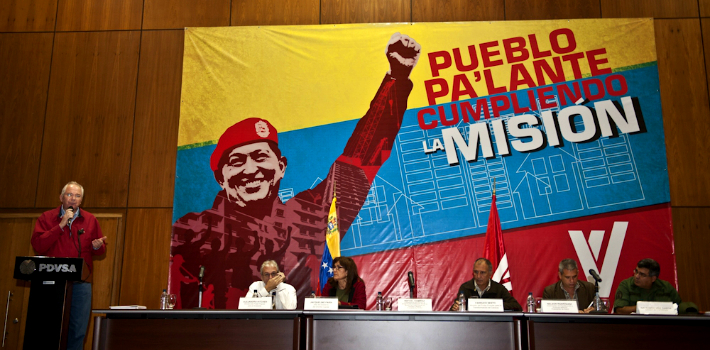
EspañolEvery day, the independent media informs us of a new scandal involving the government’s mismanagement of public funds associated with social programs. Waste, fraud, and corruption are commonplace in the so-called welfare state.
Even in the least corrupt countries, welfare programs remain controversial, given the large gap that exists between the state’s purported goals and the actual results.
On a national scale, many rulers claim to want to improve the lives of the underprivileged through greater state intervention. Yet they not only worsen the living conditions of these people in the long run, but leave the entire country in financial ruin.
Venezuela’s Hugo Chávez is a prime example of such a ruler, but Kirchner in Argentina, the Castro brothers in Cuba, and the rest of the 21st-century socialism gang all fit the bill as well.
On an international level, economic aid from the World Bank can lead to a similar situation. The World Bank was founded in 1944 to help reduce poverty around the world. However, extensive research on this subject has shown that many of their activities have been counterproductive.
So, why is this failing? Why are the results from public-aid spending so disappointing?
To answer these questions, we must divide rulers into two groups. On the one hand, we have the tricksters and con men, for whom the poor are just an excuse to use the state’s power to enrich themselves, their family, and their political allies. In this case, it’s obvious why public spending is not helping the poor: it was never the real objective.
On the other hand, we have those who are genuinely well intentioned, who tend to be the majority, and supported by their constituents. That is why, if we are truly concerned about the fate of the disadvantaged and want to help, it is important to understand the reasons why social programs will never be successful.
Nobel laureate economist Milton Friedman provides one of the most clear and simple explanations for why this happens. As he put it, there are four ways to spend money: (1) spending your money on yourself; (2) spending your money on somebody else; (3) spending someone else’s money on yourself; (4) spending someone else’s money on somebody else.
When you spend your money on yourself, you have the greatest incentive to save and get the most out of it. When spending your own money on someone else — with a gift, for example — you tend to be mindful of the cost, but not as driven to get the most out of the purchase.
In the third scenario — a travel allowance, for instance — we have no incentive to save any money, but we would try to get the most out of the cash we were given. In the last scenario, we have no incentive to save, nor any reason to stretch out the funds.
All welfare programs fall into the third and fourth category. This explains why, despite stemming from well-intended ideas, these projects inevitably end in corruption, fraud, and the outrageous squandering of resources. According to Friedman, the dynamics are as follows:
Lawmakers, who are obviously not the ones who produce funding, are in charge of approving these programs. Convinced they will benefit directly from money others will pay, voters elect politicians who promise the greatest number of projects like these. The bureaucrats who manage these large sums of money are interested in seeing some of it end up in their own pockets, and this is how the corruption begins.
Although these programs are designed to help the poor, many who do not fall into this category seek to benefit from them, and therefore fraud finds its way in. Public officials who are not yet corrupt want a slice of the pie once it’s waved in front of them. As a result, they resort to pressure tactics to increase their salaries, benefits, and perks.
In short, a very small percentage of the funds will actually get to where it is supposed to go. The lion’s share is handed out to organized interest groups made up of middle and upper-class individuals.
Whether motivated by the best of intentions or by their own greed, state officials create welfare programs that ultimately benefit the wrong people. This “generosity” on the part of politicians is financed by the uninterrupted increase in the tax burden, inflation, and public debt. The collateral damage that comes with the welfare state is the inevitable economic and financial crisis.
“One of the great mistakes is to judge policies and programs by their intentions rather than their results,” Friedman once said, and I must agree.
Public welfare is wrong, any way you look at it. In terms of economics, it creates dependency and gives little incentive to an individual to pull himself out of poverty. On an ethical level, welfare programs create the wrong attitude among those who manage funds, and they undermine democracy by turning public servants into “masters” and citizens into “servants.”
The road to economic development — one that simultaneously offers real opportunities for all and recognizes the inherent dignity of each person — is through the creation of appropriate institutions and the right incentives: free markets, rule of law, and private property.
This approach is well established. There is no mystery here, but … it’s just so tempting to live at the expense of others.
 Versión Español
Versión Español












